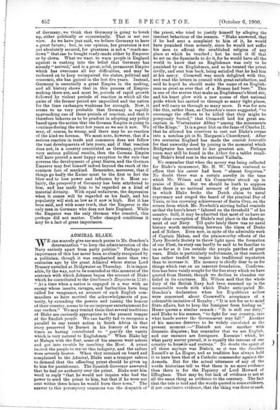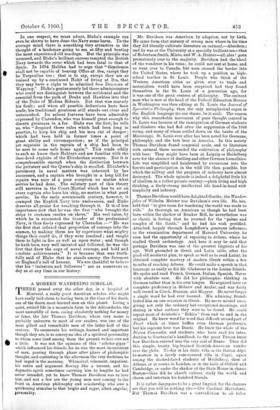ADMIRAL BLAKE.
WE can scarcely give too much praise to Mr. Goschen's determination "to keep the administration of the Navy entirely apart from party politics." Perhaps the importance of this has never been so clearly recognised by a , politician, though it was emphasised more than two centuries ago by the great Admiral whose statue Lord Brassey unveiled at Bridgwater on Thursday. It is impos- sible, by the way, not to be reminded at this moment of the sentence with which Johnson began the account of Blake which he contributed to the Gentleman's Magazine in 1740: "At a time when a nation is engaged. in a war with an enemy whose insults, ravages, and barbarities have long called for vengeance, an account of such English com- manders as have merited the acknowledgnients of pos- terity, by extending the powers and raising the honour of their country. seems to be no improper entertainment for our readers." We may remind themthat several traditions of Blake are curiously appropriate to the present temper of the English people. We can hardly fail to recognise a parallel to our recent action in South Africa in that story, preserved by Burnet in his history of his own times as having contributed to "gratify the vanity which is •very natural to Englishmen." When Blake lay at Malaga with the fleet, some of his seamen went ashore and got into trouble by insulting the Host. A priest incited the people to res-nt this indignity, and the sailors were severely beaten. When they returned on board and complained to the Admiral, Blake sent a trumpet aahore to demand that the offending priest should be given up to him for punishment. The Spanish Governor answered that he had no authority over the' priest. Blake sent him word in reply "that he would not inquire who had the power to send the priest to him' but that if he were not sent within three hours he would burn their town.". The answer to this peremptory summons was the despatch of the priest, who tried to justify himself by alleging the insolent behaviour of the seamen. "Blake answered, that if he had sent a complaint to him of it, he would. have punished them severely, since he .would not suffer his men to affront the established religion of any place at which he touched : but he took it ill that he set on the Spaniards to do it, for he would have all the world to know that an Englishman was only to be punished by an Englishman, and so he treated the priest civilly, and sent him back, being satisfied that he had him at his mercy. Cromwell was much delighted with this, and read the letters in council with great satisfaction, and said he hoped he should make the name of an English- man as great as ever that of a Roman had been." This is one of the stories that make an Englishman's blood stir, and his heart glow with a new access of that national pride which has carried us through so many tight. places, and will carry us through so many more. It was for acts like this, rather than, as Clarendon's sneer suggested, "to encourage the officers to be killed that they might be pompously buried," that Cromwell laid his great sea- captain in Westminster Abbey "among the monuments of the Kings." It is a great blot on the fame of Charles II. that he allowed his courtiers to cast out Blake's corpse into a noteless pit in St. Margaret's Churchyard. After two centuries England has made the amends honorable for that unworthy deed by joining in the memorial which Bridgwater has erected to her greatest son. Perhaps room may still be found in the Abbey for a tablet recall- ing Blake's brief rest in the national Valhalla.
We remember that when the money was being collected for Blake's monument, Mr. H. W. Wilson ventured to affirm that his career had been "almost forgotten." No doubt there was a certain novelty in the tune which Mr. Wilson and his Committee struck up in praise of Blake. But we should be loath to suppose that there is no national memory of the great battles in which Blake broke the Dutch claim to naval supremacy and singed the beard of the piratical Dey of Tunis, or the crowning achievement of Santa Cruz, on the return from which Mr. Newbolt's stirring ballad reminds us that the hero's heart "faltered on the threshold" of his country. Still, it may be admitted that most of us have no very clear conception of Blake's real place in the develop- ment of our Navy. Till quite lately there was no naval history worth mentioning between the times of Drake and of Nelson. Even now, in spite of the admirable work of Captain Mahan, and the praiseworthy. efforts of the Navy Records Society to throw light upon the formation of our Fleet, its story can hardly be said to be familiar to us so far as it lies outside the purple patches of great wars. Blake is particularly unfortunate, in that research has rather tended to impair his traditional reputation than to increase it. His memory is chiefly dear to us for things which rest on an insecure foundation. Confirma- tion has been vainly sought for the fine story which we have quoted from Burnet, though we decline to abandon our belief in its exactness. Mr. Wilson said that the whole duty of the British Navy had been sutnnied up in the memorable words with which Blake anticipated • Mr. Goschen's declaration when his Republican sailors were concerned about Cromwell's acceptance of a colourable imitation of Royalty : "It is not for us to mind State affairs, but to keep the foreigner from fooling us." Hume quotes a similar remark : "It is still our duty," said Blake to his seamen, "to fight for our country, into what hands soever the Government may fall." Another of his maxims deserves to be widely circulated at the present moment :—" Disturb not one another with domestic disputes ; but -remember that we are English, aud our enemies are foreigners. Enemies! which, let what party soever prevail, it is equally the interest of our country to humble and restrain." No doubt the spirit of all these sayings was Blake's, as it was the Jacobite Russell's at La Hogue, and as tradition has always held it to have been that of a Catholic commander against the Armada.- But for the actual utterance of any of the words historians tell us that there is no more evidence than there is for the Papistry -of Lord Howard of Effingham. That may be, but lack of evidence is not at all the same thing as evidence to the contrary. The fact that the tale is told and the words quoted is some evidence, if not conclusive evidence, that the thing was done or said. In one respect, we must admit, Blake's example can even be shown to have done the Navy some harm. . To the average mind there is something very attractive in the thought of a landsman going to sea at fifty and beating the most experienced old sea-dogs. But the principle was unsound, and Blake's brilliant success tempted the British Navy towards the error which had been fatal to that of Spain. In 1694 Halifax had to urge that "Gentlemen shall not be capable of bearing Office at Sea, except they be Tarpaulins too ; that is to say, except they are so trained up by a continued Habit of living at Sea, that they may have a right to be admitted free Denizens of Wapping." Blake's genius nearly led those administrators who could not distinguish between the accidental and the essential from the path of Drake and Hawkins into that of the Duke of Medina Sidonias But that was scarcely his fault ; and when all possible deductions have been made, his traditional greatness still stands out clear and untarnished. Its salient features have been admirably expressed by Clarendon, who was himself great enough to discern greatness in a foe. Blake was the first, he tells us, who "despised those rules which had been long in practice, to keep his ship and his men out of danger ; which had been held in former times a point of great ability and circumspection ; as if the principal art requisite in the captain of a ship had been to be sure to come safe home again." This reads oddly to such as know their Hakluyt and are familiar with the dare-devil exploits of the Elizabethan seamen. But it is comprehensible enough when the distinction between the privateer and the Queen's ship is recalled. Elizabeth's parsimony in naval matters was inherited by her successors, and a captain who brought in a, long bill for repairs was sure of a poor reception no matter what service he had done. The salutary part of this theory still survives in the Court-Martial which has to sit on every captain who loses his ship, no matter in what good service. In the early seventeenth century, however, it cramped the English Navy into uselessness, and Blake deserves all praise for breaking through it. It is of less importance now that be was the first "who brought the ships to contemn castles on shore." His real value, by which he is accounted the founder of the professional Navy, is thus finely expressed by Clarendon :—" He was the first that infused that proportion of courage into the seamen, by making them see by experience what mighty things they could do, if they were resolved ; and taught them to fight in fire as well as upon water ; and though he bath been very well imitated and followed, he was the first that drew the copy of naval courage, and bold and resolute achievements." It is because that was truth- fully said of Blake that he stands among the foremost on England's roll of honour. We are thankful to believe that his " imitators and followers" are as numerous to- day as at any time in our history.



















































 Previous page
Previous page